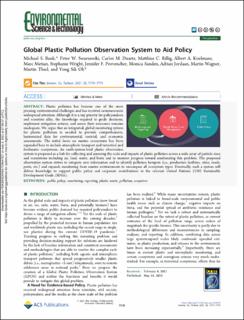Global plastic pollution observation system to aid policy
| dc.contributor.author | Bank, Michael | |
| dc.contributor.author | Swarzenski, Peter W. | |
| dc.contributor.author | Duarte, Carlos M. | |
| dc.contributor.author | Rillig, Matthias C. | |
| dc.contributor.author | Koelmans, Albert A. | |
| dc.contributor.author | Metian, Marc | |
| dc.contributor.author | Wright, Stephanie | |
| dc.contributor.author | Provenche, Jennifer F. | |
| dc.contributor.author | Sanden, Monica | |
| dc.contributor.author | Jordaan, Adrian | |
| dc.contributor.author | Wagner, Martin | |
| dc.contributor.author | Thiel, Martin | |
| dc.contributor.author | Ok, Yong Sik | |
| dc.date.accessioned | 2021-07-15T12:26:50Z | |
| dc.date.available | 2021-07-15T12:26:50Z | |
| dc.date.created | 2021-07-01T12:29:58Z | |
| dc.date.issued | 2021 | |
| dc.identifier.citation | Environmental Science and Technology. 2021, 55 (12), 7770-7775. | en_US |
| dc.identifier.issn | 0013-936X | |
| dc.identifier.uri | https://hdl.handle.net/11250/2764540 | |
| dc.description.abstract | Plastic pollution has become one of the most pressing environmental challenges and has received commensurate widespread attention. Although it is a top priority for policymakers and scientists alike, the knowledge required to guide decisions, implement mitigation actions, and assess their outcomes remains inadequate. We argue that an integrated, global monitoring system for plastic pollution is needed to provide comprehensive, harmonized data for environmental, societal, and economic assessments. The initial focus on marine ecosystems has been expanded here to include atmospheric transport and terrestrial and freshwater ecosystems. An earth-system-level plastic observation system is proposed as a hub for collecting and assessing the scale and impacts of plastic pollution across a wide array of particle sizes and ecosystems including air, land, water, and biota and to monitor progress toward ameliorating this problem. The proposed observation system strives to integrate new information and to identify pollution hotspots (i.e., production facilities, cities, roads, ports, etc.) and expands monitoring from marine environments to encompass all ecosystem types. Eventually, such a system will deliver knowledge to support public policy and corporate contributions to the relevant United Nations (UN) Sustainable Development Goals (SDGs). | en_US |
| dc.language.iso | eng | en_US |
| dc.title | Global plastic pollution observation system to aid policy | en_US |
| dc.type | Peer reviewed | en_US |
| dc.type | Journal article | en_US |
| dc.description.version | publishedVersion | en_US |
| dc.source.pagenumber | 7770-7775 | en_US |
| dc.source.volume | 55 | en_US |
| dc.source.journal | Environmental Science and Technology | en_US |
| dc.source.issue | 12 | en_US |
| dc.identifier.doi | 10.1021/acs.est.1c00818 | |
| dc.identifier.cristin | 1919824 | |
| dc.relation.project | Norges forskningsråd: 301157 | en_US |
| dc.relation.project | Havforskningsinstituttet: 15494 | en_US |
| cristin.ispublished | true | |
| cristin.fulltext | original | |
| cristin.qualitycode | 2 |
Tilhørende fil(er)
Denne innførselen finnes i følgende samling(er)
-
Articles [3012]
-
Publikasjoner fra CRIStin [3066]
